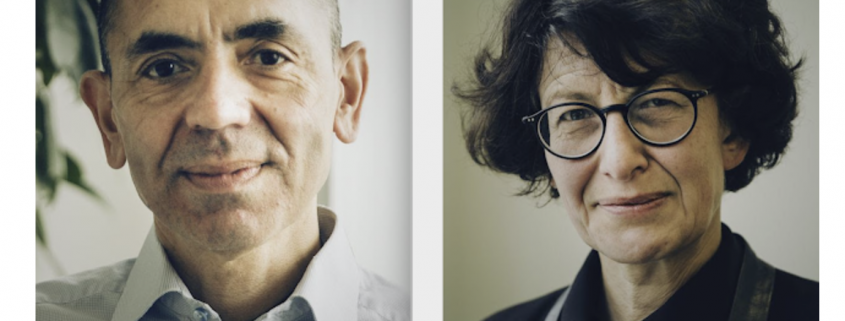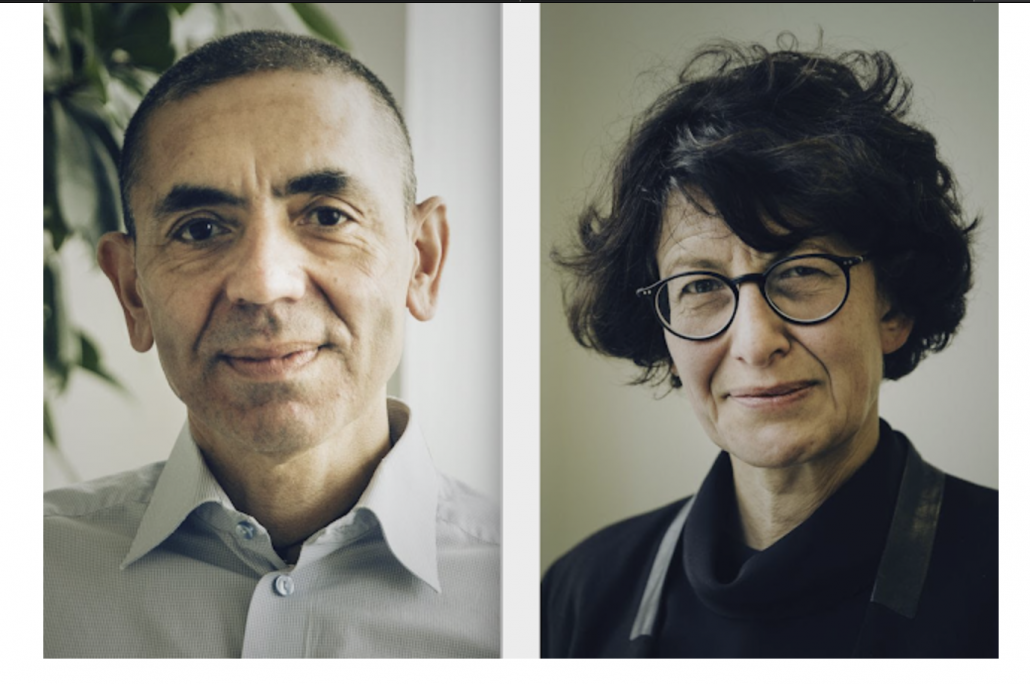Muslim Turkish Couple Behind Pfizer-BioNTech COVID-19 Vaccine
by TMO Staff
As cases of the novel coronavirus continue to increase nationwide, healthcare officials are confident that a vaccine is on the way. Dr. Anthony Fauci, director of the National Institute of Allergy and Infectious Diseases and a member of the White House coronavirus task force, told ABC News Thursday that he is hopeful that the “ordinary citizen should be able to get” a vaccine as early as April 2021. This good news comes amid a vaccine development by BioNTech, a German company, in partnership with U.S. pharmaceutical giant Pfizer. According to Pfizer, the vaccine was more than 90% effective in preventing infection in volunteers during clinical trials.
But news of the vaccine is not the only exciting part of the story. The masterminds behind the vaccine and BioNTech are scientists Dr. Ugur Sahin and Dr. Ozlem Türeci, a married couple who have dedicated their lives to studying oncology and infectious diseases. Together the Muslim couple has spent years creating immunotherapy treatments for diseases like cancer. While media outlets were quick to highlight Pfizer’s announcement of the upcoming vaccine, it wasn’t until recently that the couples’ names became known in everyday households.
The couple’s extensive research in the field of modified genetic code has allowed them to be the powerhouse behind the world’s first effective coronavirus vaccine. According to CNN, the vaccine uses “never-before-approved technology called RNA or mRNA, to spark an immune response in people who are vaccinated.”
The development is being called the “greatest medical advance” in the last 100 years by companies like Pfizer, making the couple historic pioneers. Not only is the vaccine the fastest one ever developed, but its efficacy is much higher than virologists ever hoped for. As a result, the couple’s company BioNTech has seen a significant increase in worth, which now sits at almost $4 billion.
“It could be the beginning of the end of the Covid era,” Sahin told The New York Times Tuesday. In an earlier interview, he noted that “There are not too many companies on the planet which have the capacity and the competence to do it so fast as we can do it. So it felt not like an opportunity, but a duty to do it, because I realized we could be among the first coming up with a vaccine.”
He added that the partnership BioNTech created with Pfizer was personal from the start. Prior to collaborating on the COVID-19 vaccine, the two companies worked together on a flu vaccine in 2018. Sahin then bonded well with Albert Bourla, the Greek chief executive of Pfizer, over shared backgrounds and identities as both scientists and immigrants.
“We realized that he is from Greece, and that I’m from Turkey,” Dr. Sahin said, without mentioning their native countries’ long-running antagonism. “It was very personal from the very beginning.”
Both Sahin and Türeci were born in Turkey and immigrated to Germany at a young age. But their paths to medicine differed greatly. While Sahol was the child of a car factory worker, Türeci grew up with a surgeon as a father. Their shared passion for medical and disease research allowed their paths to cross while pursuing medicine. Despite the couple’s historic accomplishments, they still remain humble and dedicated to helping others above all. “I don’t have a car. I’m not going to buy a plane,” Sahin told The Washington Post, noting that the company’s monetary value does not affect the couple. “What’s life-changing is to be able to impact something in the medical field.”
When asked about being role models for future generations of Germans with migrant backgrounds, the couple noted the importance of equality and not assuming one race is more intelligent than another. “I am not sure I really want that. I think we need a global vision that gives everyone an equal chance. Intelligence is equally distributed across all ethnicities, that’s what all the studies show. As a society, we have to ask ourselves how we can give everyone a chance to contribute to society. I am an accidental example of someone with a migration background. I could have equally been German or Spanish,” Sahin told The Guardian.
A year before they married, Türeci and Sahin founded their first pharmaceutical company, Ganymed Pharmaceuticals, in 2001. Having been drawn together over a shared passion for medical research, the couple set out to use immunotherapy in cancer vaccines. According to the Times, they even began their wedding day in a research lab, attended the ceremony, then returned back to work. “I understood that what we can offer cancer patients at the hospitals is not much, and we could do more by bringing new discoveries to the patient’s bedside,” Türeci told LABIOTECH in a 2017 interview. “In 2008, we recognized another platform had reached a maturity point where they had to be accelerated towards individualized vaccines, and BioNTech was founded,” Türeci added.
According to Reuters, an article published in The Lancet in January on Wuhan’s outbreak sparked Sahin’s interest in a COVID-19 vaccine and how BioNTech’s work could be applicable. This led to a partnership with Pfizer in March.
The vaccine has left health officials and scientists feeling optimistic after it outperformed expectations in phase three of trials. “If the question is whether we can stop this pandemic with this vaccine, then my answer is: yes, because I believe that even protection only from symptomatic infections will have a dramatic effect,” ?ahin said told The Guardian.
While the trials do not guarantee the vaccine will prevent transmission of the virus, this development has been the most effective one yet.
“The vaccine hinders Covid-19 from gaining access to our cells. But even if the virus manages to find a way in, then the T-cells bash it over the head and eliminate it. We have trained the immune system very well to perfect these two defensive moves. We now know that the virus can’t defend itself against these mechanisms,” Sahin said.
As people live in fear while the coronavirus pandemic impacts millions across the world, news of this couple’s achievements brings hope. As of this report, more than 52.9 million people have been infected with COVID-19 and at least 1.2 million have died worldwide as a result, according to The New York Times database.

















2020
1,397 views
views
0
comments